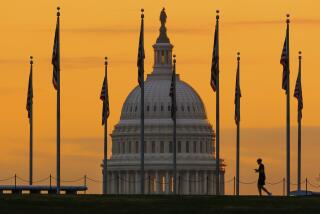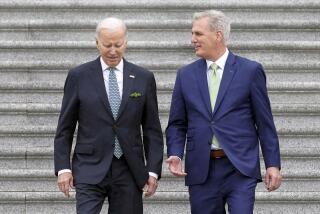Republicans less likely to compromise than Democrats, poll says
- Share via
Americans routinely express frustration that politicians in Washington can’t rise above partisanship to find a compromise. That talk has been especially thick as Congress and President Obama posture and dig in on the tax-and-spending plan they must reach to avoid the onerous New Year’s rebudgeting known as the fiscal cliff.
It appears, though, that the citizens disturbed about Capitol gridlock exhibit some of the same ambivalence about compromise as the people they put in office.
A poll by Colby College and SurveyUSA released Monday found that a solid majority (61%) of Americans say it is more important for a politician to find compromise solutions than to stick to principles (35%).
When asked about specific policy disputes, though, the survey respondents quickly soured on the idea of meeting halfway.
PHOTOS: The best shots from the 2012 campaign
When it came to settling disagreements over the federal deficit, for instance, just 41% said they would be very or somewhat likely to compromise with those who disagreed with them. That compared with 34% who said they would be very or somewhat likely to give something to reach a budget accord. An additional 20% were unsure.
Voters got even sketchier about giving up their own position when it came to a series of other emotional issues, as demonstrated by the low percentage who said they would like compromise on: immigration (34%), healthcare reform (33%), same-sex marriage (21%) and abortion (17%).
Members of the two political parties also take starkly different views of political compromise. The poll found that 73% of Democrats and 60% of independents preferred compromise solutions. Only 38% of Republicans said the same.
The poll was developed by Colby College professor Daniel M. Shea. Since 2010 Shea has spearheaded a series of studies on civility and compromise.
QUIZ: How much do you know about the fiscal cliff?
“Instinctively, Americans want compromise solutions and elected officials should take that to heart,” said Shea. “But when we dive into specific policies, it gets a bit fuzzy.”
Shea is the co-editor of a new collection of essays on civility in politics, titled “Can We Talk? The Rise of Rude, Nasty, Stubborn Politics.”
SurveyUSA surveyed 1,534 registered voters by phone between Nov. 11 and Nov. 19. The poll has a margin of error of plus-or-minus 2.5%.
Follow Politics Now on Twitter and Facebook
Twitter: @latimesrainey
More to Read
Get the L.A. Times Politics newsletter
Deeply reported insights into legislation, politics and policy from Sacramento, Washington and beyond. In your inbox twice per week.
You may occasionally receive promotional content from the Los Angeles Times.










